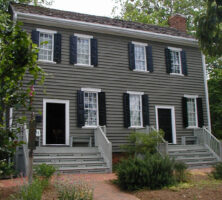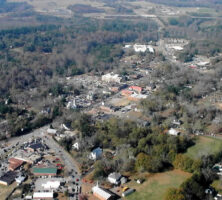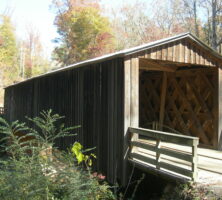Watkinsville, the seat of Oconee County, has been a center of social life and a hub for local politics in northeast Georgia since the early nineteenth century. The city is located approximately fifteen miles south of Athens and sixty miles east of Atlanta.
Early History
Named after Colonel Robert Watkins of Augusta, a lawyer and early compiler of A Digest of the Laws of the State of Georgia through 1799, Watkinsville was a village located on the dangerous western frontier of the new United States between Creek and Cherokee territories. Fort Edward offered a modicum of protection, but the members of Mars Hill Baptist Church, founded in 1799, still carried guns to their Sunday services.

Eagle Tavern, believed to stand on the site of the old Fort Edward, opened in 1801 and today serves as the Oconee County Welcome Center, as well as a museum commemorating the era of wagon and stage travel. Travelers from Madison and Greensboro visited the hotel and tavern, which became famous thanks to the legend of a Confederate veteran. The lore of Eagle Tavern holds that a Southern soldier hid in its attic as Union troops moved through the town after they were defeated at the Battle of Sunshine Church on July 31, 1864. The soldier was cared for by enslaved people, who provided him with food and coal.
Watkinsville first appeared in Clarke County records in 1791, only fifty-eight years after James Edward Oglethorpe founded the colony of Georgia. In 1802 John Cobb gave up eight lots of his plantation to create the city. It then became the seat for Clarke County and remained so until 1872, when Athens took over that role. Angry locals voted to create a new county, named after the Oconee River on its eastern border, and Watkinsville became its seat on February 25, 1875.

Plantation agriculture dominated the early economy. Cotton was the crop of choice, with enslaved laborers working the fields. In the census of 1810, 35 whites and 55 enslaved people made up the town’s population. By 1860 there were 447 whites and 426 enslaved persons.
In 1905 one of the worst acts of racial violence in Georgia’s history occurred outside of Watkinsville. Eight African American men and one white man were lynched on the pretense that one of them had tried to rape a white woman. A mob of seventy-five men took the unprotected prisoners, who had no apparent relationship to one another, out of the Oconee County jail while the judge and sheriff were apparently out of town.
People and Places
The Methodist Church has played a prominent role in the city’s history and founded a cemetery there in the early 1800s. Watkinsville was the birthplace of two famous Methodists, Bishop Atticus G. Haygood in 1839 and his sister, Laura Haygood, in 1845. Laura Haygood became one of the first Christian missionaries to China and the principal of an Atlanta girls’ school. Bishop Haygood was chaplain to the Confederate army during the Civil War (1861-65) and served as president of Emory College in Oxford from 1875 to 1884. Their family home in downtown Watkinsville, known as the Haygood House, today houses the Chappelle Gallery.

One of the last wooden bridges still used on a public road in Georgia stands south of Watkinsville. The Elder Mill Covered Bridge was built in the late 1800s and is one of the few left in the state.
Printed in Watkinsville on Thursdays, the Oconee Enterprise is one of the last family-owned weekly newspapers in Georgia. A country printer named L. Shackelford founded the paper in 1884, which was funded by legal advertisements that mostly reported farm closures. Today the Oconee Enterprise is owned by a mother-daughter team, Vinnie and Maridee Williams.
Modern Watkinsville
A small but bustling city, Watkinsville no longer depends upon agriculture as its lifeblood. The city’s agricultural economy has been replaced by light industry, small businesses, and the development of an arts community. Southwire, a Carrollton-based manufacturer of wire and cable products, and AmeriPride, an apparel and linen service company, are major employers in the city, and the Oconee Industrial Park features a number of businesses and light industries. The Town Center retail and office complex in downtown Watkinsville contains upscale restaurants, salons, and shops, while antique and retail shops line Main Street. The city, whose motto is “The Artland of Georgia,” also supports a thriving arts community that contributes to the local economy. The Oconee Cultural Arts Foundation, located in the old Watkinsville High School, joins the Chappelle Gallery, Happy Valley Pottery, and a host of retail art stores and artists in the area. Because of the city’s proximity to Athens, many Watkinsville residents work at the University of Georgia.
Eagle Tavern, Harris Shoals Park, and the Oconee County Courthouse attract visitors from throughout the area. The historic South Main Street District, listed on the National Register of Historic Places, includes the Ashford Memorial Methodist Church, the Haygood House, and Ashford Manor. Ashford Manor, a bed and breakfast, conducts summer pop and classic concerts and supports various charitable events, including “Grace’s Birthday Party,” an annual fundraiser for veterinary research and pet adoption.
According to the 2020 U.S. census, Watkinsville covers 3.23 square miles and has a population of 2,896.









